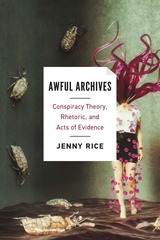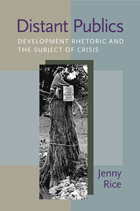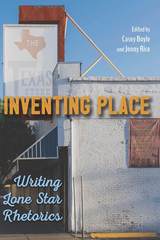3 books by Rice, Jenny

Awful Archives
Conspiracy Theory, Rhetoric, and Acts of Evidence
Jenny Rice
The Ohio State University Press, 2020
How does evidence happen? And when evidence happens badly, how can we find a fitting response to those making extraordinary claims? These are the questions driving Jenny Rice’s groundbreaking study into the life of evidence as she seeks to uncover why traditional modes of argument often fail in the face of claims that rely on bad evidence. The chapters make a deep dive into the nature and character of evidence itself by examining literal archives, though some quite unorthodox, as well as more popular archives that exist within public memory. Rice looks to examples that lie at the fringes of public discourse—pseudo-science, the paranormal, conspiracy theories about 9/11, the moon landing, UFO sightings, and Obama’s birth record. Such fringe examples, Rice argues, bring to light other questions about evidence that force us to reassess and move beyond traditional forms of ethics and debate.
After sketching a broader framework for understanding what evidence is, Awful Archives then asks how we can practice more ethical and productive forms of debate, especially when we’re faced with arguments that feel like a dead end. Thorough, engaging, and deeply insightful, Awful Archives: Conspiracy Theory, Rhetoric, and Acts of Evidence introduces an entirely new perspective on evidence—one that will impact the field for years to come.
After sketching a broader framework for understanding what evidence is, Awful Archives then asks how we can practice more ethical and productive forms of debate, especially when we’re faced with arguments that feel like a dead end. Thorough, engaging, and deeply insightful, Awful Archives: Conspiracy Theory, Rhetoric, and Acts of Evidence introduces an entirely new perspective on evidence—one that will impact the field for years to come.
[more]

Distant Publics
Development Rhetoric and the Subject of Crisis
Jenny Rice
University of Pittsburgh Press, 2012
Urban sprawl is omnipresent in America and has left many citizens questioning their ability to stop it. In Distant Publics, Jenny Rice examines patterns of public discourse that have evolved in response to development in urban and suburban environments. Centering her study on Austin, Texas, Rice finds a city that has simultaneously celebrated and despised development.
Rice outlines three distinct ways that the rhetoric of publics counteracts development: through injury claims, memory claims, and equivalence claims. In injury claims, rhetors frame themselves as victims in a dispute. Memory claims allow rhetors to anchor themselves to an older, deliberative space, rather than to a newly evolving one. Equivalence claims see the benefits on both sides of an issue, and here rhetors effectively become nonactors.
Rice provides case studies of development disputes that place the reader in the middle of real-life controversies and evidence her theories of claims-based public rhetorics. She finds that these methods comprise the most common (though not exclusive) vernacular surrounding development and shows how each is often counterproductive to its own goals. Rice further demonstrates that these claims create a particular role or public subjectivity grounded in one’s own feelings, which serves to distance publics from each other and the issues at hand.
Rice argues that rhetoricians have a duty to transform current patterns of public development discourse so that all individuals may engage in matters of crisis. She articulates its sustainability as both a goal and future disciplinary challenge of rhetorical studies and offers tools and methodologies toward that end.
Rice outlines three distinct ways that the rhetoric of publics counteracts development: through injury claims, memory claims, and equivalence claims. In injury claims, rhetors frame themselves as victims in a dispute. Memory claims allow rhetors to anchor themselves to an older, deliberative space, rather than to a newly evolving one. Equivalence claims see the benefits on both sides of an issue, and here rhetors effectively become nonactors.
Rice provides case studies of development disputes that place the reader in the middle of real-life controversies and evidence her theories of claims-based public rhetorics. She finds that these methods comprise the most common (though not exclusive) vernacular surrounding development and shows how each is often counterproductive to its own goals. Rice further demonstrates that these claims create a particular role or public subjectivity grounded in one’s own feelings, which serves to distance publics from each other and the issues at hand.
Rice argues that rhetoricians have a duty to transform current patterns of public development discourse so that all individuals may engage in matters of crisis. She articulates its sustainability as both a goal and future disciplinary challenge of rhetorical studies and offers tools and methodologies toward that end.
[more]

Inventing Place
Writing Lone Star Rhetorics
Edited by Casey Boyle and Jenny Rice
Southern Illinois University Press, 2018
Bringing together methods and scholars from rhetoric and related disciplines, essays in Inventing Place: Writing Lone Star Rhetorics blend personal and scholarly accounts of Texas sites, examining place as an embodied poiesis, an understanding and composition formed through the collaboration of a body with a particular space.
Divided into five sections corresponding to Texas regions, essays consider aesthetics, buildings, environment, food and alcohol, private and public memory, and race and class. Among the topics covered by contributors are the Imagine Austin urban planning initiative; the terroir of Texas barbecue; the racist past of Grand Saline, Texas; Denton, Texas, and authenticity as rhetorical; negative views of Texas and how the state (or any place) is subject to reinvention; social, historical, and economic networks of place and their relationship to the food we eat; and Texas gun culture and working-class character.
Divided into five sections corresponding to Texas regions, essays consider aesthetics, buildings, environment, food and alcohol, private and public memory, and race and class. Among the topics covered by contributors are the Imagine Austin urban planning initiative; the terroir of Texas barbecue; the racist past of Grand Saline, Texas; Denton, Texas, and authenticity as rhetorical; negative views of Texas and how the state (or any place) is subject to reinvention; social, historical, and economic networks of place and their relationship to the food we eat; and Texas gun culture and working-class character.
[more]
READERS
Browse our collection.
PUBLISHERS
See BiblioVault's publisher services.
STUDENT SERVICES
Files for college accessibility offices.
UChicago Accessibility Resources
home | accessibility | search | about | contact us
BiblioVault ® 2001 - 2024
The University of Chicago Press









